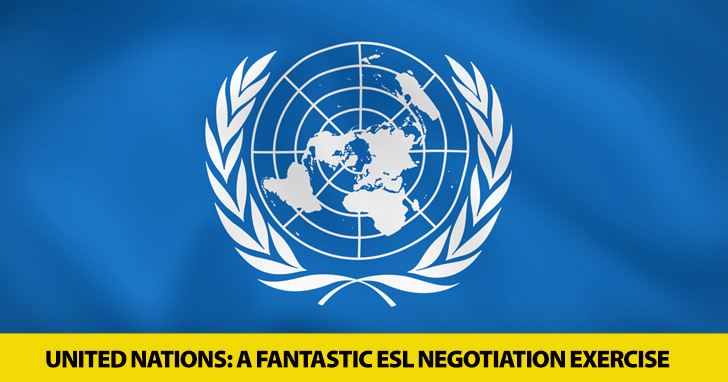
A few years ago, I found the need for an ESL discussion task which was fun, flexible, suitable for almost any level, and dependent on the minimum of resources.
I ended up creating United Nations, perhaps my most successful exercise. It is a negotiation and strategy game which produces a ton of language with minimal set-up, practices all four skills, deals with interesting issues of culture, identity and nationalism, and has led to some of the most enjoyable classes of my whole time as a teacher. Here are the basics:

Try This Fantastic ESL Negotiation Exercise in 7 Simple Steps
-
1
Establish Your Scenario
A crisis is brewing, somewhere in the world. For years, I have used the fictitious nations of Telgusia and Borkazia. They have been at war in the past, and simmering differences are threatening to bubble over into hostilities once more.
-
2
Provide Some Geography
Using two or three colors, create a simple map of this fictional region on the board. My two warring nations are large neighboring countries on an unidentified continent. Their border area, which I name ‘The Highlands’ is a rough, sparsely populated, mountainous region whose sole redeeming feature is a recently discovered and potentially vast oil deposit.
-
3
Give Some Background
Why are these two nations at each other’s throats? Either as a listening or (preferably) as a reading exercise, provide some details. This is probably best broken into sections, with check questions after each one (e.g. Whose soldiers were captured? What’s the name of the disputed region? What are the benefits of Hi-Grow?)
Reasons for the escalating tensions could include:
- Territorial dispute. The Highlands are the central the problem. As a piece of land, it is nearly worthless, but the potential oil resources could transform the economy of the country which gains local control.
- Border skirmishes. CNN has reported a firefight at the border. Perhaps one or more soldiers has been captured.
- Proposed technology exchange. I include as part of the scenario a new and potent fertilizer called Hi-Grow. In a revolutionary twist, it has no negative environmental impact. One country has created this product, while the other seeks to acquire it. The exchange is then built into the overall package, along with access to the oil, territorial delineation, the return of captured soldiers, etc.
- Relations with a third party. In my scenario, there is a third country to the south, Ramaria. More developed and wealthy than the other two, Ramaria has offered military technology to both sides. Part of the agreement between them could include a moratorium on weapons purchases.
- Access to a sacred site. Just to spice things up, for my more advanced students, I include an ancient temple called Kannia, which lies across the border from where most of its devotees live. It is a place of great importance, and all devotees are expected to make the journey at least once during their lives.
Access to the temple is complicated by the border dispute, but also potentially by a poor security situation (bandits along the route), historically punitive visa fees, random border closures which strand pilgrims on the wrong side of the border, etc. A deal to secure access to the temple should address these issues, and could be included in the general package.
-
4
Decide Your Teams
United Nations has worked best in two teams of 4-6 (Ramaria needs no team of its own), but team sizes of 8-10 have also worked well. Ensure that not all of your most gifted or talkative debaters are on the same side, and consider a mix of genders and (if you have a multi-national class) ethnicities and first languages.
-
5
Decide Your Structure
How quickly, and by what method, will you communicate the different elements of the discussion? One good way is to start small - describe The Highlands and try to achieve some kind of deal between the two sides - and then add the extra elements (the temple at Kannia, the possible exchange of Hi-Grow, limitations on relations with Ramaria, the return of captured soldiers, etc) piece by piece.
-
6
Moderate the Debate
There are a lot of elements for your students to juggle here, so they’ll need reminders (best done on handouts, or as a list on the board) of what is at stake, and any agreements they have already reached. Congratulate them on each new compromise, but feel free to throw a wrench into the works.
For example, they might agree a 50-50 split from the oil revenues, but you might then ask where the huge infrastructure funding will come from, given the remote and barren nature of the region.
They may agree to return the captured soldiers, but you might suddenly decide that one of the soldiers has died in custody, or returns home to report having been brutally tortured.
Similarly, you might secretly whisper to its developers that Hi-Grow is, in fact, not nearly as potent and valuable as they originally said, and that it is actually a negotiating ruse; or worse, that it will deliberately poison the opposing nation’s soil, leaving it reliant on expensive food imports from abroad.
The possibilities are endless, but I urge you to plan carefully and game out the scenario, perhaps with fellow teachers or friends, before bringing it to your class. My students have always respected the way in which United Nations has come to feel polished and assured as I have developed the exercise. You might also consider building up a stock of ‘Event Cards’ or handouts with background information; I change the details almost every time I play United Nations, to add complexity and nuance to the discussion, or to bring in particular themes I believe my students will enjoy.
-
7
Help The Teams Reach a Conclusion
I’ve played variants of United Nations which took two and a half hours; others have taken forty minutes. Keep an eye on the time and, long before it is up, invite your teams to reach a final compromise. Good example include:
- The soldiers are returned; Kannia is given the status of ‘Open City’ and security is improved along the route; the costs of developing The Highlands are shared equally, as are the oil profits.
- Hi-Grow is transferred, along with scientists to help train farmers in its use; the Highlands are declared a national park, under joint administration, with no drilling allowed on environmental grounds; the two governments issue a communiqué detailing their willingness to work together and solve their differences.
And… my all-time favorite:
- The two governments work towards achieving a federation of their countries, declaring each a nuclear-free zone, banning weapons sales and freely exchanging Hi-Grow and other technology. Once the federation is secured, The Highlands will be the spectacular location for a huge music festival to celebrate the event.
Perhaps not surprisingly, this remarkable compromise was achieved (after ninety minutes’ constant language production) by a multi-national, all-female team.
Please feel free to adapt and alter these ideas to suit your own classes.
I hope you find United Nations useful and have fun making your own versions.
P.S. If you enjoyed this article, please help spread it by clicking one of those sharing buttons below. And if you are interested in more, you should follow our Facebook page where we share more about creative, non-boring ways to teach English.







